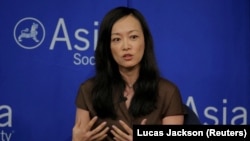The indictment of a former CIA analyst who allegedly worked for the South Korean government — and the abrupt resignation of the top U.S. envoy for North Korea — will not affect the coordination between Washington and Seoul in dealing with Pyongyang's threats, said former U.S. officials who dealt extensively with relations between the United States and South Korea.
Sue Mi Terry, a former CIA analyst and prominent North Korea expert, has been indicted by a New York grand jury on charges of secretly working for the South Korean government, serving as a secret agent for South Korea's main intelligence agency in exchange for luxury goods, expensive meals and $37,000 for a public policy program that she controlled, according to an indictment unsealed last week.
Damning indictment
Terry served in the U.S. government from 2001 to 2011, first as a CIA analyst and later as the deputy national intelligence officer for East Asia at the National Intelligence Council, before working for think tanks.
Terry is a well-known North Korea expert with a prominent media presence. News of her indictment rattled North Korea experts in Seoul and Washington.
"At the direction of ROK government officials, Terry advocated ROK policy positions, including in published articles and during media appearances, disclosed nonpublic U.S. government information to ROK intelligence officers, and facilitated access for ROK government officials to U.S. government officials," according to the indictment, which was released Wednesday. ROK refers to the Republic of Korea or South Korea.
Prosecutors say Terry never registered with the Justice Department as a foreign agent. She faces two counts, one for failing to register under the federal Foreign Agents Registration Act and the other for conspiring to violate it.
Abrupt resignation
The indictment of Terry followed the abrupt resignation earlier this month of Jung Pak, the U.S. senior official for North Korea, who oversaw North Korean affairs at the U.S. State Department.
A State Department spokesperson told VOA's Korean Service via email on July 9 that Pak "stepped down from her duties as U.S. senior official for the DPRK and deputy assistant secretary of state for East Asian and Pacific Affairs on July 5."
DPRK stands for the Democratic People's Republic of Korea, North Korea's official name.
The indictment and the resignation come as North Korea escalates tensions on the Korean Peninsula while Washington is enhancing security cooperation with Seoul.
U.S. President Joe Biden and South Korean President Yoon Suk Yeol met on July 11 on the sidelines of the NATO summit in Washington. They reaffirmed their commitments to the Washington Declaration, which is designed to reinforce U.S. extended deterrence to South Korea in response to North Korea's advancing nuclear threats.
US-ROK ties
Some South Korean news media outlets raised concerns that the indictment of Terry could affect overall ties between the U.S. and South Korea.
Former U.S. officials say these are separate events that are unlikely to affect the joint efforts by the U.S. and South Korea in addressing the North Korean issues.
Susan Thornton, who served as acting assistant secretary of state for East Asian and Pacific Affairs during the Trump administration, told VOA's Korean Service via email Friday that she doesn't believe there would be any disruption to the U.S.-South Korea bilateral coordination.
"Sue Mi Terry is not in the government and the position of DPRK special representative was created to focus on negotiations with North Korea, which do not appear likely any time soon," Thornton said.
"The two governments currently have ample channels for regular coordination on DPRK threats through the Departments of State, Defense, U.S. forces in Korea and the National Security Council, among others," she added.
"I will say that I foresee no reduction in cooperation and coordination between the U.S. and South Korea, especially in the combined military relationship," said Harry Harris, former U.S. ambassador to South Korea during the Trump administration, in an email to VOA's Korean Service on Friday.
Close coordination
The U.S. dismissed the concerns over the possible friction with one of its closest allies in the world.
"We will continue to consult closely with the Republic of Korea, Japan and other allies and partners about how to best engage the DPRK, deter aggression and coordinate international responses to the DPRK's violations of multiple U.N. Security Council resolutions," a State Department spokesperson told VOA's Korean Service in a written statement Friday, referring to South Korea by its official name.
The spokesperson said that the vacancy of the U.S. official, who would solely cover the North Korean affairs, will not affect the U.S. policy toward North Korea.
"EAP Assistant Secretary Dan Kritenbrink is currently overseeing DPRK policy for the Department of State. Ambassador Julie Turner continues to serve as special envoy on North Korean Human Rights," the spokesperson said. EAP is the State Department's term for East Asian and Pacific affairs.
Seoul also stressed that South Korea and the U.S. are cooperating and maintaining close communication at various levels related to North Korea policy.
"The director of the Korean Peninsula Policy Bureau continues to serve as the special representative for North Korea and communicates closely with the U.S. counterpart, and the Director of Diplomatic Strategy and Intelligence Division is discussing issues that require high-level consultations," a spokesperson for the South Korean foreign ministry told VOA's Korean Service via email Friday.




